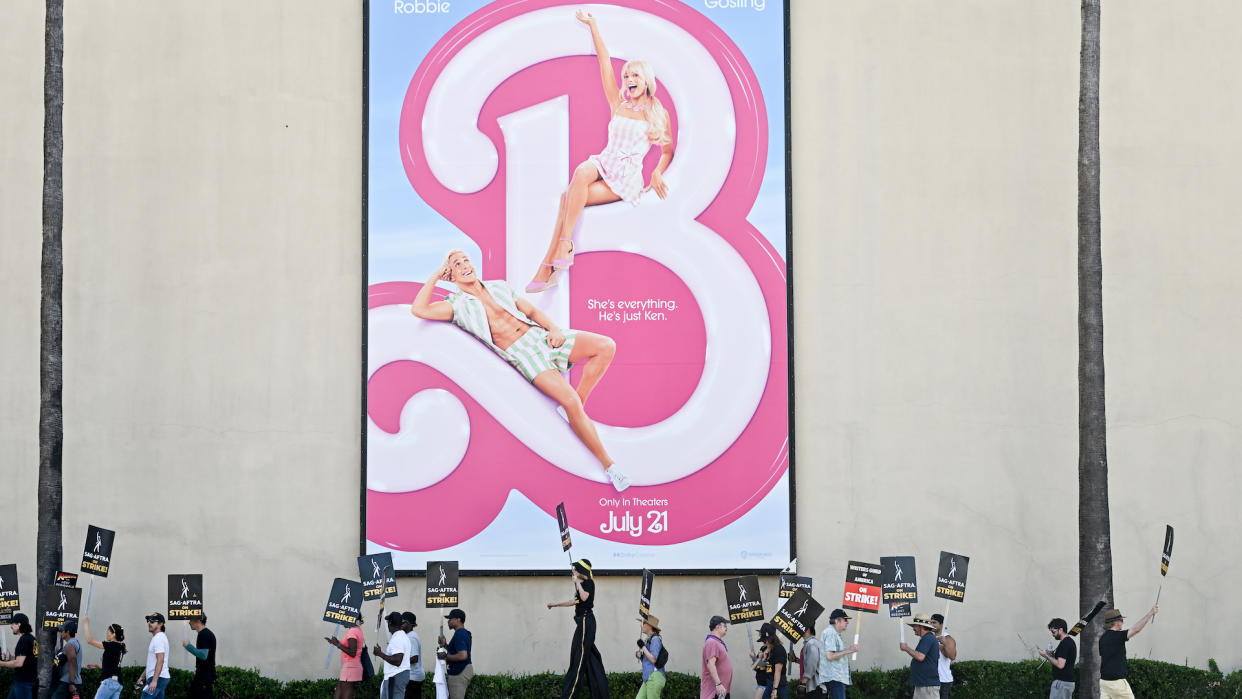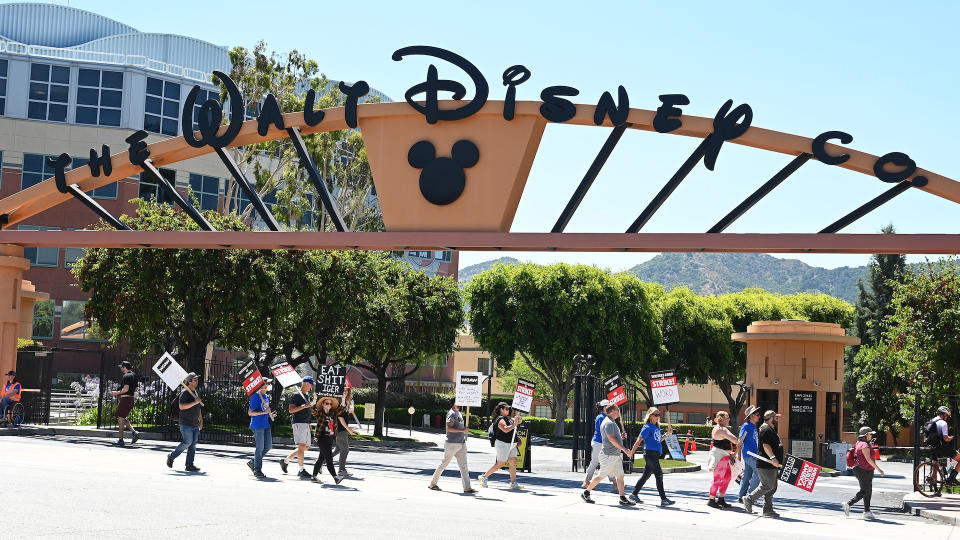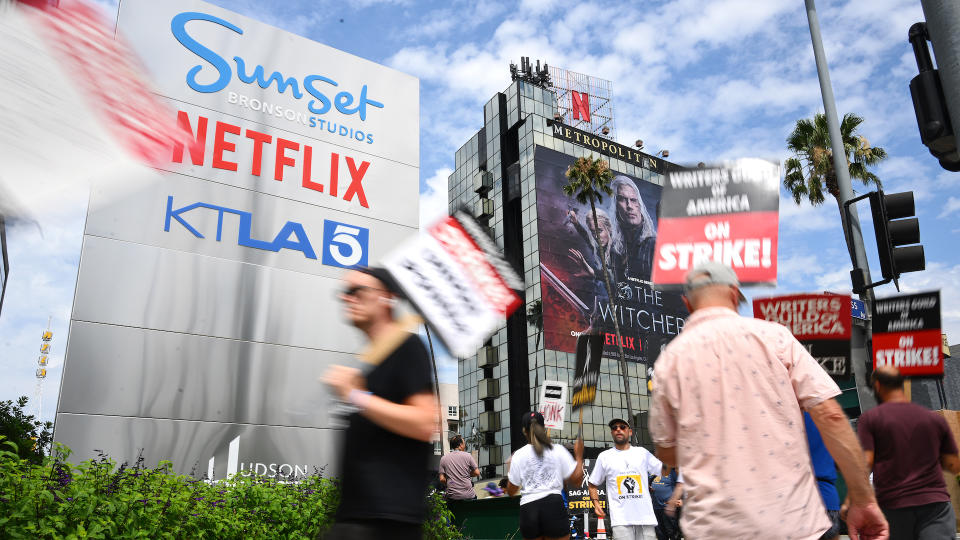Here’s How Much Money Each Studio Says They’ve Saved During the Strikes (So Far)

The writers and actors strikes are good for business? Fake news, says the guilds. Well, technically, the WGA called that point-of-view “calculated disinformation.” Of course, they’re also the union back at the bargaining table with the studios of the Alliance of Motion Picture and Television Producers (AMPTP).
Truth is, the companies are saving money, but only in the short term. With no productions comes no production costs — the free cash flow is truly free-cash flowing. It’s been a temporary reprieve for both the strapped streamers who now realize their business isn’t bulletproof and for the legacy media companies reliant on the dying linear-television medium. But that’s the whole thing; it’s temporary.
More from IndieWire
Roughly 1 in 5 Films with a SAG-AFTRA Interim Agreement Wouldn't Get One Now
'Tron: Ares' Delayed by Strike: Director Calls Out 'Extremely Frustrating' Negotiations
Still, the town’s chief financial officers are making hay while the sun shines and the studio lights do not. Better-than-expected results in the June quarter have given way to improved forecasts for the September one.
Below, IndieWire has compiled some of the biggest media companies’ biggest savings from April to June, and what they expect for the near future. Quick memory jog: the writers went on strike on May 2, the actors followed suit months later on July 14.
Warner Bros. Discovery
Warner Bros. Discovery reported $1.7 billion in free cash flow; the strike produced “modest” cash savings in the “low” $100-million range, CFO Gunnar Wiedenfels said.
He and his boss, David Zaslav, are modeling for the strikes to be over by “early September,” Wiedenfels said. Should that prove optimistic and the strikes run through December, Wiedenfels said he “would expect several hundred-million-dollars upside” to the company’s current cash guidance.
Of course, there are plenty of variables at play. Should Warner Bros. delay upcoming theatrical releases like “Dune: Part Two,” “Wonka,” or “Aquaman 2,” the studio’s current financial projections should be tossed right out the window.
Paramount Global
Well, Paramount’s free cash flow hasn’t been fixed by the strike — but it’s still being aided. The company reported negative FCF of $210 million in the June quarter. That includes what CFO Naveen Chopra called a “modest impact” from the work stoppage. More help is coming.
“We anticipate continued delays in production for the duration of the strikes, and as such, we estimate free cash flow in the back half of the year will be significantly higher than previously expected,” Chopra said.
Chopra’s boss, Paramount Global CEO Bob Bakish, has vowed to “minimize disruptions” for consumers as a result of the strikes. There are some strings he can pull. As first reported via Screen Daily, the studio will be prepping to shoot “Sonic the Hedgehog 3” without actors and using a splinter unit to capture plate shots, or filming background shots that will be used when they add in a CGI Sonic and Tails later.
Still: “Yellowjackets,” a Showtime series, is one on hold due to the writers strike, and Paramount Pictures has halted production on “Gladiator 2.”

The Walt Disney Company
In May, then-CFO Christine McCarthy said Disney expected to spend $32 billion on content this year —$1 billion less than an earlier estimate. Fast-forward one quarter, one new (interim) CFO, and two strikes, and the internal estimate is down to $27 billion.
Temp Chief Financial Officer Kevin Lansberry said that huge drop is down “in part” because of the dual strike. Pre-strikes, Disney planned to cut costs across the company by $5.5 billion. That effort has included layoffs and pulling content from Disney+; some of those savings have been realized sooner than expected.
Disney has delayed some of its bigger tentpoles earlier than other studios; Marvel films generally do not have locked scripts and are finalized in the course of production. Well, now they have no one to lock up those scripts let alone play them out for production.
From April to June, Disney had $1.6 billion in free cash flow. It took quite a bath though on the wildly expensive (and failed) Galactic Starcruiser hotel, with $100 million in accelerated depreciation realized in the quarter.
Comcast (NBCUniversal)
While Comcast’s broadband business won’t really be directly impacted by the strikes, its NBCUniversal is certainly not immune.
“The longer it goes, the worse it will be,” Comcast President Mike Cavanagh said on his company’s earnings call. “It’s, obviously, going to have a negative impact all around.”
Cavanagh said there’s “nothing to quantify” in terms of 2023’s lower working capital translating to higher free cash flow. He was quick to point out that the “flip side” of that seesaw awaits companies next year.
“Obviously, the longer the strike, the more that could have an effect as you look into 2024 and beyond, and that would be for ourselves and others, obviously,” Cavanagh said. “So it’s a level playing field.”
In terms of NBCU’s streaming service Peacock, he’s not seeing a direct impact for ’23. Execs believe Peacock is poised for a nice run with “The Super Mario Bros. Movie,” “Twisted Metal,” what remains of NBC’s fall-TV schedule, an exclusive NFL Wild Card game, Big Ten sports rights, and “John Wick” spinoff “The Continental.”

Netflix
Netflix expects $5 billion in free cash flow for 2023. While the company can thank the strikes for some of that, they’re really just one of three factors.
CFO Spencer Neumann said the giant increase in his prior estimate of $3 to $3.5 billion also came from the early success of Netflix’s password-sharing crackdown, as well as “the typical ins and outs” of production timing.
Of course, one factor is less predictable than the others. “There’s still a pretty wide range of outcomes for where we’re going to ultimately land on cash flow this year given the ongoing strikes,” he said.
Neumann’s content spend in 2023 will be “roughly flat” with the prior year, he said, when Netflix spent $16.7 billion. If the dual strikes go on and on, that number will be forced lower. Either way, Neumann expects to be right around $17 billion for 2024.
Sony
Sony had “Spider-Man: Across the Spider-Verse” in the June quarter, but due to the strikes, it won’t have “Spider-Man: Beyond the Spider-Verse for quite a few quarters beyond its original Spring 2024 target.
Also as a direct result of the shutdown, Sony decreased its prior forecast for 2024 sales revenue by 50 billion yen — a 3 percent drop that equates to roughly $345 million. In addition to the third “Spider-Verse” movie, Sony Pictures has also pushed the releases of the next “Ghostbusters” and the R-rated Marvel spinoff “Kraven the Hunter.”
Lionsgate
Lionsgate is not a member of the AMPTP, which means no one is striking Lionsgate. That doesn’t mean it’s immune to the effects.
CFO James Barge said on his company’s quarterly earnings call that Lionsgate took a $30 million hit to revenue as a result of the strike. While the strikes can still impact any area of the business, Lionsgate’s talent-management arm 3 Arts seems disproportionately ripe for the impact.
Barge said on Aug. 9 that the company has already baked into its guidance the ongoing impacts of the strikes, should they continue. Lionsgate has factored the impact in through the September quarter.
“We have built in an assumption that the strike goes through the September quarter,” Barge said. “We factored that in. If it goes longer, it’s a similar impact, probably, as it rolls quarter to quarter. If it does, we’re hopeful that things get resolved and we’re back to work in the mid-fall.”
Honorable Mentions
Apple and Amazon, which didn’t mention the strikes or savings at all during their respective earnings calls.
Best of IndieWire
Unsimulated Sex Scenes in Film: 'Nymphomaniac,' 'Brown Bunny,' 'Little Ashes,' and More
The Best LGBTQ Movies and TV Shows Streaming on Netflix Right Now
Sign up for Indiewire's Newsletter. For the latest news, follow us on Facebook, Twitter, and Instagram.

